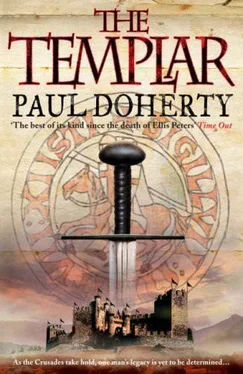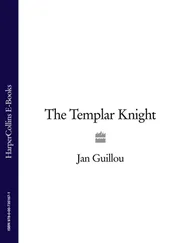P. Doherty - The Templar
Здесь есть возможность читать онлайн «P. Doherty - The Templar» весь текст электронной книги совершенно бесплатно (целиком полную версию без сокращений). В некоторых случаях можно слушать аудио, скачать через торрент в формате fb2 и присутствует краткое содержание. Год выпуска: 2010, ISBN: 2010, Издательство: Minotaur Books, Жанр: Исторические приключения, на английском языке. Описание произведения, (предисловие) а так же отзывы посетителей доступны на портале библиотеки ЛибКат.
- Название:The Templar
- Автор:
- Издательство:Minotaur Books
- Жанр:
- Год:2010
- ISBN:9780312576837
- Рейтинг книги:5 / 5. Голосов: 1
-
Избранное:Добавить в избранное
- Отзывы:
-
Ваша оценка:
- 100
- 1
- 2
- 3
- 4
- 5
The Templar: краткое содержание, описание и аннотация
Предлагаем к чтению аннотацию, описание, краткое содержание или предисловие (зависит от того, что написал сам автор книги «The Templar»). Если вы не нашли необходимую информацию о книге — напишите в комментариях, мы постараемся отыскать её.
The Templar — читать онлайн бесплатно полную книгу (весь текст) целиком
Ниже представлен текст книги, разбитый по страницам. Система сохранения места последней прочитанной страницы, позволяет с удобством читать онлайн бесплатно книгу «The Templar», без необходимости каждый раз заново искать на чём Вы остановились. Поставьте закладку, и сможете в любой момент перейти на страницу, на которой закончили чтение.
Интервал:
Закладка:
The chamber they entered was ill-lit and cold. An officer, his head framed by a chain-mail coif, his damascened helmet on the table before him, shoulders draped by a dark blue cloak over an armoured breastplate, was warming his hands above a chafing dish. Around the room lounged men, crouching or lying down, playing knucklebones, whispering amongst themselves or half asleep. They rose as Theodore’s party entered. One of them muttered a joke; a few laughed. Two of the soldiers drew their curved swords and daggers. The officer beckoned Theodore closer and spoke quickly in the lingua franca. Theodore replied. Now and again the officer’s cold black eyes shifted to Eleanor, who caught her own name being mentioned. Theodore kept pointing to her, and with a flick of his finger dismissed Imogene and Simeon as mere nobodies. The conversation continued. All four were abruptly searched, and Theodore’s weapons taken, as was the grisly bundle. When the three severed heads, eyes blindly staring, lips bloody and parted, rolled out across the floor, the officer gave a brief smile. He rose and kicked all three heads to one of his soldiers, who picked them up and put them in a reed basket. The officer returned, leaning against the table, arms crossed. He stared hard at Theodore and the questioning began again. Abruptly, the tension eased. The officer was laughing, poking Theodore in the chest, nodding; he even turned and smiled at Eleanor, then he gestured to the far corner. They went and squatted down, making themselves comfortable.
‘Don’t talk,’ Theodore whispered in Latin. ‘Except about what we are supposed to be, deserters from the Army of God.’
‘I…’ Imogene’s eyes rounded as she tried to speak.
‘Trust me, Imogene,’ Eleanor hissed. ‘For God’s sake hold your peace.’
‘I know him.’ Theodore smiled and gestured at the officer, who was now sitting at the table talking to one of his men. ‘We fought in the same troop some years ago. In fact,’ he clapped his hands and gestured around, ‘I am sure they all know me.’ Again he lapsed into Latin. ‘Keep your peace, do exactly what I tell you. Don’t talk unless I say.’
The officer shouted an order. A man left and came back with a bowl containing a mixture of meat and hot peppery sauce, as well as a jug of what smelt like curdling milk. They shared this out amongst themselves and had hardly finished when the officer strolled across. He snapped his fingers, gesturing at them to rise, and they followed him out of the chamber, down a narrow passageway and on to a slippery cobbled lane. A well of inky darkness, filled with slinking shapes and strange smells, greeted them. On both sides of the lane, the dusty walls of buildings reared up to the sky, so close they almost touched, leaving a narrow slit above them. With a clink of armour, the officer and his escort led them along this twisting byway. No glimmer of light showed from door or window, nothing except the lantern horns of their escort. A deathly silence held, as if they were crossing some City of the Dead. The lane descended more steeply. They stumbled down broken steps and across rough cobbles. On either side rose buildings with small windows high up in the decaying walls drenched with fetid-smelling liquids, the slimy moss, dirt and grime glittering in the light of the lanterns. Small doors were set deep in these walls, murky openings leading down to gloomy cellars, the dwelling places of vermin. Out of these cellars billowed the stench of rotting garbage and decaying excrement. The smell of dead rats, an odour Eleanor was used to from the camp, hung heavy and foul. They turned a corner and were almost pushed into the downstairs room of what looked like a hostelry or tavern. The officer led them across this into a rear chamber. He gestured at Theodore, then left. The door was not locked. There was a cesspit outside, and more food — fruit, dried bread and brackish water — was brought. Theodore, whispering swiftly in Latin, made it very clear that they would be spied on: the chamber walls probably had eyelets and listening holes. He then dominated the conversation, talking loudly in the lingua franca about how pleased he was to be in Antioch, eager to sell his sword to his new masters. Eleanor, lying next to Imogene, pressed her lips against her companion’s ear. She whispered in quick, short sentences how they had decided to flee the Army of God. They were now safe, and Imogene must not to do anything to alert suspicion. Imogene, of course, had a spate of questions, but Eleanor refused to answer, turning on her back to secure some sleep.
The following morning the officer returned. They were to be seen by Yaghi Siyan himself, the Governor of Antioch. Imogene was now openly resentful at what had happened, though she quickly realised that if she wished to survive she would have to comply. Nevertheless, the dark glances and the muttering under her breath clearly informed Eleanor that she no longer had a friend. The officer also returned their possessions, including Imogene’s precious box and Theodore’s weapons. The Turk was even friendlier than the previous evening, Theodore’s desertion being regarded apparently as a glittering prize. He took them out into the streets. They had to shield their eyes for a while; the clouds had broken and the sun was strengthening. The officer was apparently under strict instructions to show these important deserters how strong Antioch was. The narrow streets he led them through teemed with men of many nationalities, all busy about their various affairs. They entered the great square, thronged with market stalls under their striped awnings offering bread, rice, meats already cooked and roasted in stews, together with pheasant and partridge, as well as fruit and vegetables including heaps of ripe watermelons. The officer bought slices of these and offered them round. The sweet juice tasted delicious, refreshing Eleanor’s mouth and throat. Further on, stalls displayed silks, rubies, pearls, cloths and a wide range of spices. Deeper into the city they passed parks and paradises with graceful names such as ‘the Sweet Green’ and ‘the Oasis of Fruitfulness’. In between these lay the trade quarters of the city: weavers, ironworkers, goldsmiths, potters, bowl-makers, tile-makers, craftsmen of every description.
The morning air was still cool, but already the din and clatter of the city was ringing out. People looked well fed and content. Eleanor’s heart sank. The Army of God was apparently having little effect, a fact the officer loudly proclaimed as he gestured at the stalls piled high with produce. To achieve anything, Eleanor reflected, each of Antioch’s gates had to be closely besieged. They entered the wealthy quarter with its well-paved squares and streets. The fine buildings, decked in blue and gold tiles, overlooked elegant drinking fountains, richly decorated pools and elaborate bathhouses. High above all these loomed the minarets like watchful sentinels over the blue-domed mosques, their gleaming brickwork laced with elegant script done in turquoise and navy blue.
At last they reached the square stretching up to the ruler’s palace, its buildings almost hidden by the luxurious greenness of its many orchards. Only here was the normal bustle of the city shattered by a gruesome scene. A spy, so the officer informed them, had been caught and was about to be executed. The unfortunate, bound hand and foot, was being dragged face down at the tail of a horse across the cobbled square, backwards and forwards until his body and face were torn to shreds. In places the blood swirled in puddles or congealed between the stones as the condemned man was reduced to nothing but a bloody rag bouncing behind the horse’s hooves. The officer waited, eager to create a lasting impression upon his guests, before he crossed the square and led them through an ornamental gate with panels of mosaic faience and polished copper. Guards in brightly coloured quilted armour, soft boots on their feet, with turbans or spiked helmets over chain-mail coifs, patrolled every entrance. Others, Mamelukes in lamellar hauberks and breastplates, stood in recesses, armed with kite-shaped shields and wickedly pointed spears.
Читать дальшеИнтервал:
Закладка:
Похожие книги на «The Templar»
Представляем Вашему вниманию похожие книги на «The Templar» списком для выбора. Мы отобрали схожую по названию и смыслу литературу в надежде предоставить читателям больше вариантов отыскать новые, интересные, ещё непрочитанные произведения.
Обсуждение, отзывы о книге «The Templar» и просто собственные мнения читателей. Оставьте ваши комментарии, напишите, что Вы думаете о произведении, его смысле или главных героях. Укажите что конкретно понравилось, а что нет, и почему Вы так считаете.












